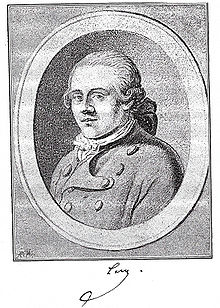Zerbin or The Newer Philosophy
Zerbin or the newer philosophy is a story by Jakob Michael Reinhold Lenz , which Heinrich Christian Boie had printed in his magazine Deutsches Museum in February and March 1776.
Marie dies out of love for Zerbin.
content
The sometimes moralizing first-person narrator draws his material from the posthumous writings of Zerbin, a master's degree in philosophy in Leipzig.
Zerbin, a young man of noble disposition, can no longer bear the greed of his father, a Berlin usurer . So he decides to stand on his own two feet from now on. The gifted Zerbin went to Gellert at the Leipzig University, rose there on his own to the master's degree in mathematics and finally taught algebra . The rich young Danish Count Altheim joins him from among his audience. Zerbin, as the count's mentor , receives regular financial support from the Dane.
One after the other, Zerbin met three young women in Leipzig. Zerbin's love for Mademoiselle Renatchen Freundlach, the sister of one of the richest bankers in Leipzig, is one-sided. Renatchen only uses the unfortunate Zerbin to catch the Danish count. Renatchen's intrigue in this regard is the death of the friendship between Zerbin and Altheim. The count's payments are not made. Zerbin gets into financial difficulties. Renatchen has no luck with men. Altheim kills a second rival in a duel and escapes from Leipzig.
The master turns to Hortensia, the daughter of his landlord. Hortensia, a notorious bookworm, does not want to give Zerbin any love either, but only wants to become the wife of a master's degree. When looking for a young woman, Zerbin receives urgently needed financial support from kind-hearted Marie. Marie is the only daughter of the rich Walter - Schulze in a village near Leipzig. The slim, cheerful, funny, doe-footed Marie is Zerbin's attendant and loves the master from the bottom. Zerbin takes advantage of this drunkenness of happiness. He seduces the innocent peasant girl. During her pregnancy, he made false promises to her. Now that Zerbin has got what he wanted from Marie, he takes his marriage vows lightly. The faithless wavers. He would also like to have Hortensia's considerable dowry and begs Marie to hide her pregnancy - ostensibly to keep his position at the university. Zerbin seeks support from his father and sends a sign of life to Berlin. The father was robbed in Berlin, is now impoverished and now needs support himself. When Marie's confinement approaches, she is left alone by Zerbin. In the hopeless situation, Marie secretly gives birth to her child. It is dead. The child's body is discovered. Marie is imprisoned. Under current law, she faces the death penalty . The father visits Marie in the dungeon and wants to know the name of the child's father. Marie does not reveal Zerbin. The unfortunate woman is beheaded . Zerbin realizes that Marie died for him. The scholar throws himself from the wall into the moat. His body is found lying in the water below.
reception
- Boie praises the Zerbin as prose, "more excellent than I know another in our language".
- For the citizen's taste, Lenz tells in Zerbin "even too reasoning and declamatory".
- Voit emphasizes the author's creative power and cites the scene in the dungeon as an example when Marie lies to her father out of love for Zerbin shortly before her death.
- Zerbin left home because he morally condemned his father. In a foreign country, in the struggle for his own independence, Zerbin makes a compromise in a property-oriented environment, pays “with moral rascality”. Lenz wrote the story in Strasbourg at the end of 1775 after a trial.
expenditure
source
- Friedrich Voit (ed.): Jakob Michael Reinhold Lenz: Stories. Zerbin. The forest brother. The country preacher . Pp. 3-30. Reclam Stuttgart 1988 (edition 2002). 165 pages. With notes (pp. 125–141) and an afterword (pp. 147–165), ISBN 3-15-008468-7
First edition
- Text of the story: Deutsches Museum 1st vol., 1776 (pp. 116–131, pp. 193–207)
expenditure
- Alfred Gerz (Ed.): Jakob Michael Reinhold Lenz: Zerbin or the newer philosophy , Rütten & Loening, Potsdam 1943, 71 pages
- Zerbin or the newer philosophy. Pp. 269-295. In: Helmut Richter (ed.): Lenz: Works in one volume . 4th edition. Aufbau-Verlag, Berlin / Weimar 1986. Introduction by Rosalinde Gothe. Notes pp. 405–406, 418 pages.
literature
- Gero von Wilpert : Lexicon of world literature. German Authors A-Z . Stuttgart 2004, ISBN 3-520-83704-8 , p. 386, 698 pages.
Web links
Individual evidence
- ↑ Source, p. 123, 3. Zvo and see also under “First edition” in this article.
- ↑ see also under maid : maid, servant coming from rural circles. If such a young girl “waits”, then she serves in the city with gentlemen.
- ^ Letter of January 10, 1776 to Lenz, quoted by Voit in the source, p. 164, 7th Zvu
- ↑ insightful, sensible
- ^ Letter of March 31, 1776 to Boie, quoted by Voit in the source, p. 164, 12th Zvu
- ↑ Source, p. 165 above
- ↑ R. Gothe in the edition of H. Richter (Ed.), P. XX, 4. Zvo
- ↑ Notes in the edition of H. Richter (Ed.), P. 405, 13. Zvu
